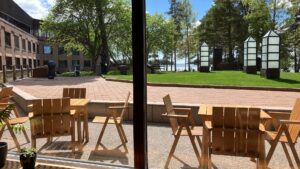This year’s intensive course for Swedish and Finnish journalism students had energy journalism as its theme. The intensive course, organized at Hanaholmen, the cultural centre for Sweden and Finland, is part of a course programme that started in 2019. From year to year, the pedagogy of the course is based on listening to expert lecturers, paying study visits and working in a pop-up newsroom.
The best part of a bilateral intensive course is the possibility to compare societies and cultures. Participants have the same language, Swedish, but are living in different societal systems and, contrary to the general belief, do not often know about each others’ everyday lives. By systematically comparing societal systems and language use in two countries students can come up with new knowledge about the Nordic area. This was the case in many of this year’s student articles that discussed, among other things, green transition, housing and smart electricity networks.

Students also wrote a diary about their week in the aesthetically pleasing environment of the design hotel and marine conference centre. In particular, food plays a central role in the Hanaholmen experience. The conference centre has a fisherman of its own, and the kitchen is known for its culinary excellence. Located at the shore of the Baltic Sea, the cultural centre forms a unique milieu for networking across the two countries, which is one important longer-term objective of the intensive course for future professionals.
The journalism course programme is organized yearly in May, and students enrolled in journalism education study programmes at Swedish and Finnish universities are eligible to apply. Three journalism schools are involved in the arrangements: University of Gothenburg (JMG), University of Helsinki (Soc & kom), and Tampere University (ITC). In this year’s edition, we had also participants from Linnæus University and Umeå University.
Årets 2023 upplaga av journalistkursen @Hanaholmen handlar om #energi. Journalisten Malin Avenius @JMGoteborg är redo att ge tips till j-studenter från 🇫🇮&🇸🇪 i hur man navigerar i energiforskarens värld. ”Energi har blivit mer politik, #energijournalistik viktigare än någonsin.” pic.twitter.com/8Yat8sp0Wy
— Dr. Maarit Jaakkola (@maaritjii) May 15, 2023
Once again, I want to thank my great colleagues for a wonderful teaching experience: Jenny Stenberg-Sirén from the Swedish School of Social Sciences at the University of Helsinki, Emil Östlund from the Department of Journalism, Media and Communication at the University of Gothenburg, and Tiinaliisa Granholm from Hanaholmen – as well as this year’s guest lecturers, professor Peter Lund from Aalto University, journalist Katarina Koivisto from the newspaper Hufvudstadsbladet and journalism teacher Malin Avenius from JMG.

Be the first to comment on "Journalism education in Swedish-Finnish collaboration"